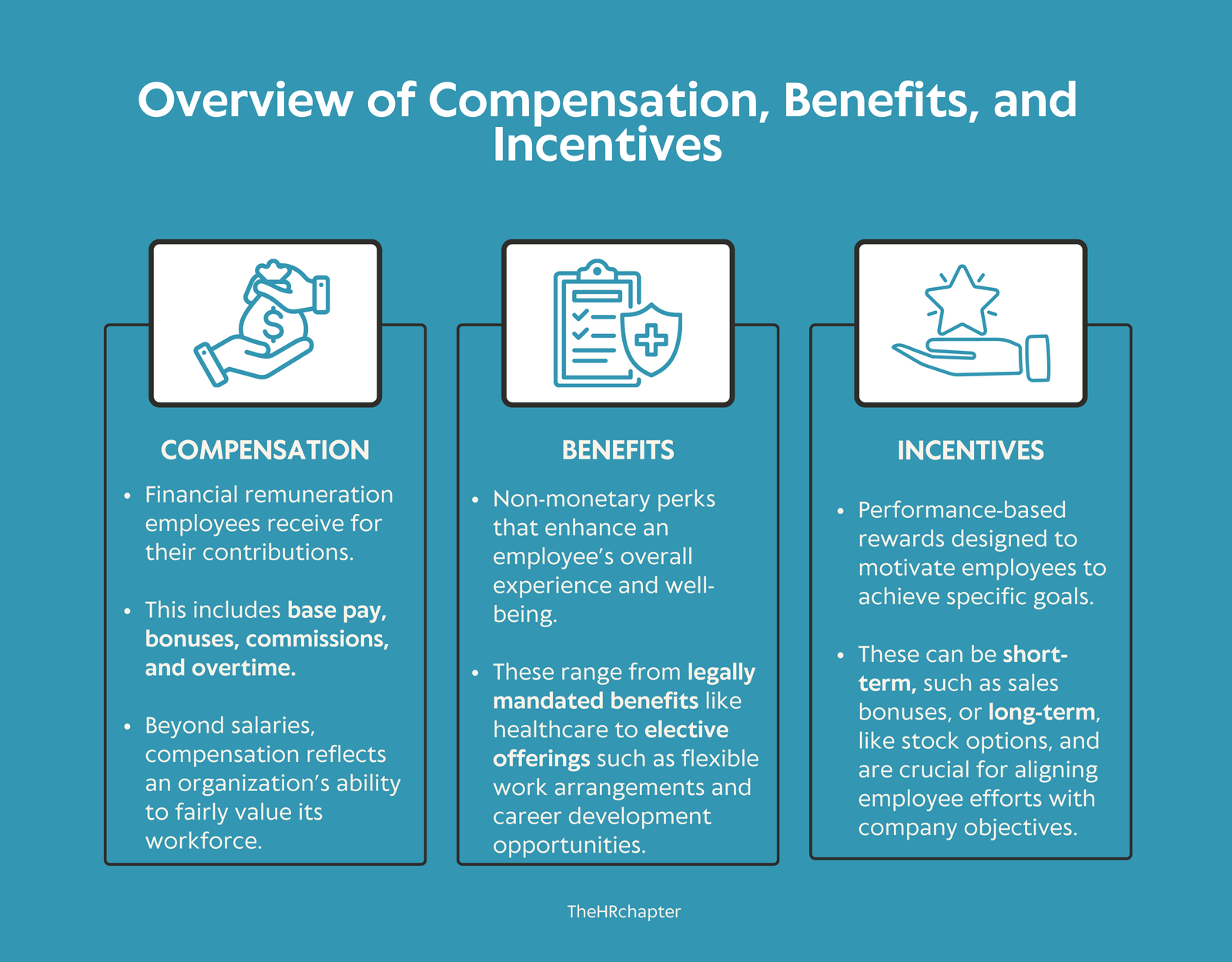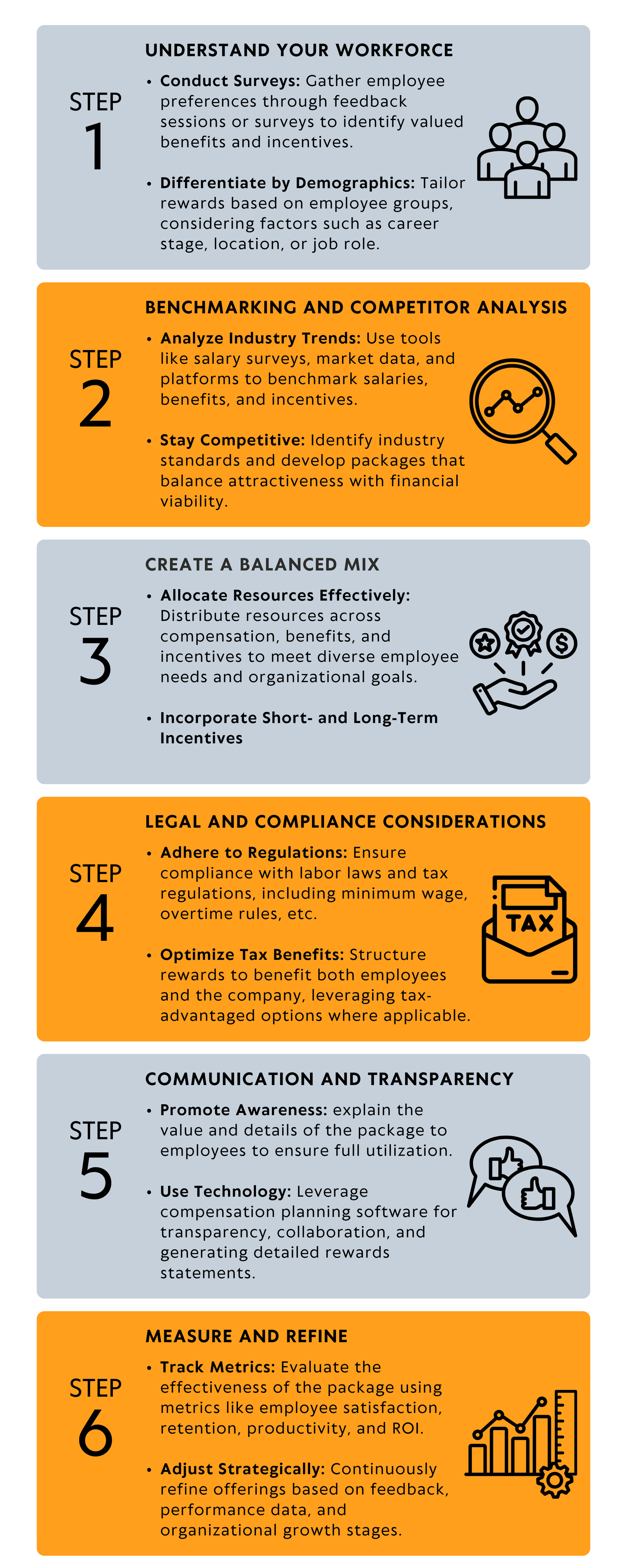Your ultimate guide in Total Rewards: Designing attractive Compensation & Benefits packages with short- and long-terms incentives

In today’s competitive job market, organizations must offer more than just a paycheck to attract and retain top talent. Total rewards is a comprehensive approach to employee compensation and benefits that goes beyond basic salary. It encompasses everything employees receive in exchange for their work, including monetary compensation, non-monetary benefits, incentives, career development opportunities, and work-life balance initiatives. For SMEs and start-ups, adopting a Total Rewards strategy can be a game-changer, enabling them to compete with larger organizations by offering value-driven, employee-centric packages.
At the heart of Total Rewards are three pillars: compensation, benefits, and incentives. Together, these elements form a holistic rewards strategy that not only meets employees’ financial needs but also supports their career growth and personal well-being.

Why total rewards matter for SMEs and Start-ups
Total Rewards play a critical role for SMEs and start-ups, enabling these organizations to effectively compete with larger corporations in the talent market. A well-rounded rewards strategy signals a commitment to employee well-being, making the organization more attractive to potential hires. Beyond attracting talent, total rewards address employees’ diverse needs and aspirations—such as career development, flexible work options, and meaningful benefits—fostering loyalty and reducing turnover.
Moreover, total rewards drive motivation and engagement by aligning individual goals with organizational objectives. Tailored incentives and comprehensive benefits help employees feel valued and invested in their roles, boosting performance and satisfaction. By adopting this holistic approach, SMEs and start-ups can create a compelling value proposition that supports both talent acquisition and retention while enhancing overall organizational success.

Balancing short- and long-term incentives
Successfully balancing short-term and long-term incentives is critical for SMEs and start-ups aiming to attract, retain, and motivate talent while driving sustainable growth. Each type of incentive serves distinct purposes: short-term incentives (STIs) focus on achieving immediate goals and measurable outcomes, whereas long-term incentives (LTIs) encourage employee loyalty and alignment with the organization’s strategic objectives. Together, they provide a comprehensive rewards strategy tailored to the dynamic needs of smaller organizations.
- Designing effective short-term incentives
- STIs are particularly valuable for motivating employees to achieve immediate targets and contribute to the organization’s short-term success.
- Effective STIs can include bonus programs tied to individual and team performance, sales incentives for goal-specific achievements, and gamified approaches such as contests, leaderboards, and spot rewards that boost engagement.
- Long-term incentives for strategic growth
Long-term incentives, on the other hand, foster employee loyalty and encourage alignment with the company’s broader vision.
LTIs, such as equity compensation (e.g., stock options or phantom stocks), profit-sharing, and deferred compensation plans, are especially effective in retaining key talent and incentivizing them to contribute to the organization’s sustained success.

Achieving the Right Balance
To maximize the impact of incentives, SMEs and start-ups must strike a balance between addressing immediate needs through STIs and fostering long-term commitment via LTIs. This balance should align with the company’s growth stage and financial capacity. For example, early-stage start-ups may focus on high-risk, high-reward LTIs, such as significant equity grants, to attract entrepreneurial-minded talent. In contrast, SMEs with more established operations might use STIs to drive specific performance goals while offering modest LTIs to build loyalty.
By integrating short- and long-term incentives into their total rewards strategy, SMEs and start-ups can create a dynamic work environment that not only meets present challenges but also supports future growth.
Practical steps to design an attractive total rewards package
Creating an effective Total Rewards package that integrates short- and long-term incentives requires a structured approach. Below are key steps to ensure alignment with business goals and employee needs:

An attractive total rewards package for SMEs and start-ups is built on a foundation of understanding employee needs, benchmarking, balancing resources, and maintaining compliance. By aligning incentives with organizational goals and fostering transparency, businesses can enhance motivation, loyalty, and long-term success.
Leveraging technology in total rewards
- Tools and Platforms for SMEs
- SMEs can leverage affordable HR and payroll systems like BambooHR, Gusto, and Paylocity to streamline HR management, payroll processing, tax filing, and employee benefits administration, reducing errors and ensuring compliance while enhancing efficiency and satisfaction.
- Additionally, analytics tools such as Paycom’s Beti and Zenefits provide valuable insights into workforce trends, helping SMEs optimize resource allocation and align benefits with employee needs.
- These platforms track key performance indicators, including turnover rates and employee satisfaction, enabling businesses to evaluate and refine their total rewards strategies effectively.
- Streamlining Communication
Employee engagement tools like TINYpulse, Officevibe, and 15Five support transparent communication by enabling regular feedback, recognition, and updates on rewards and benefits, keeping employees informed and motivated.
Self-service portals integrated within HR systems further empower employees by providing access to personalized compensation and benefits information, fostering clarity and trust.
Additionally, comprehensive HRIS platforms such as GoCo and Zenefits centralize data on compensation, performance reviews, and benefits, ensuring consistent access to accurate information for both employees and managers while minimizing confusion.

Overcoming challenges in total rewards for SMEs and Start-Ups
For small and medium-sized enterprises (SMEs) and startups, developing effective total rewards programs can be especially challenging, primarily due to limited budgets, the need for scalability, and retention risks.
- To overcome limited budget constraints, creative approaches such as partnering with benefits vendors for group discounts and focusing on non-monetary rewards can be key strategies. Additionally, recognition programs and career development opportunities can enhance employee motivation without requiring significant financial investment
- Scalability is another challenge as these organizations grow. A successful rewards package must adapt to the evolving needs of the workforce. SMEs should invest in systems and processes that allow easy updates to compensation and benefits structures as the company expands, ensuring that the reward system remains competitive and aligned with the organization’s goals
- Retention risks are often heightened by the desire to remain competitive with larger companies that may offer more substantial rewards. Balancing external competitiveness with fostering intrinsic motivation is crucial.
Elevate Your Talent Strategy: Unlock the Power of Total Rewards with TheHRchapter
By designing attractive compensation and benefits packages with balanced short- and long-term incentives, you empower your organization to attract, engage, and retain top talent.
At TheHRchapter, we specialize in crafting total rewards strategies tailored to the unique needs of SMEs and start-ups. Our expertise ensures your organization stands out with comprehensive, employee-centric solutions that align with your goals and resources.
Ready to transform your rewards approach into a competitive advantage? Let TheHRchapter be your ultimate partner in building a total rewards system that drives success. Contact us today to start designing the future of your workforce!
Need help with other HR services for your business?
At TheHRchapter, we provide tailored solutions to guide startups and scaleups in choosing and implementing the best tools for hiring, onboarding, payroll, employee management and more.
Core HR Services
- HR Consulting: Provides expert advice on various HR matters, including policies, procedures, and compliance
- HR Services for Startups: Offers tailored solutions for startups, helping them establish a strong HR foundation.
- Recruitment & Headhunting: Whether you’re looking for fresh talent or niche experts, we ensure a smooth, personalized process tailored to your specific needs.
- Payroll Services: Manages payroll processing, tax filings, and employee benefits.
Let us help you streamline your HR processes and achieve your business goals. Contact us today to get started!
Spread the Word!
Enjoyed what you’ve read? Help others discover it too! 📢 Share this article and let’s keep the discussion going.
Related Reads: Check out these other Articles!
Expanding to Europe? Why Hiring Is Where Scale Usually Breaks (and How to Fix It Early)
Expanding to Europe? Why Hiring Is Where Scale Usually Breaks (and How to Fix It…
Agentic AI and HR Ethics: Best practices and ensuring compliance for employees and candidates
Agentic AI and HR Ethics: Best practices and ensuring compliance for employees and candidates There’s…
2025: The Year HR Became Strategic – Key Lessons and Insights for HR Leaders
2025: The Year HR Became Strategic – Key Lessons and Insights for HR Leaders 2025…



